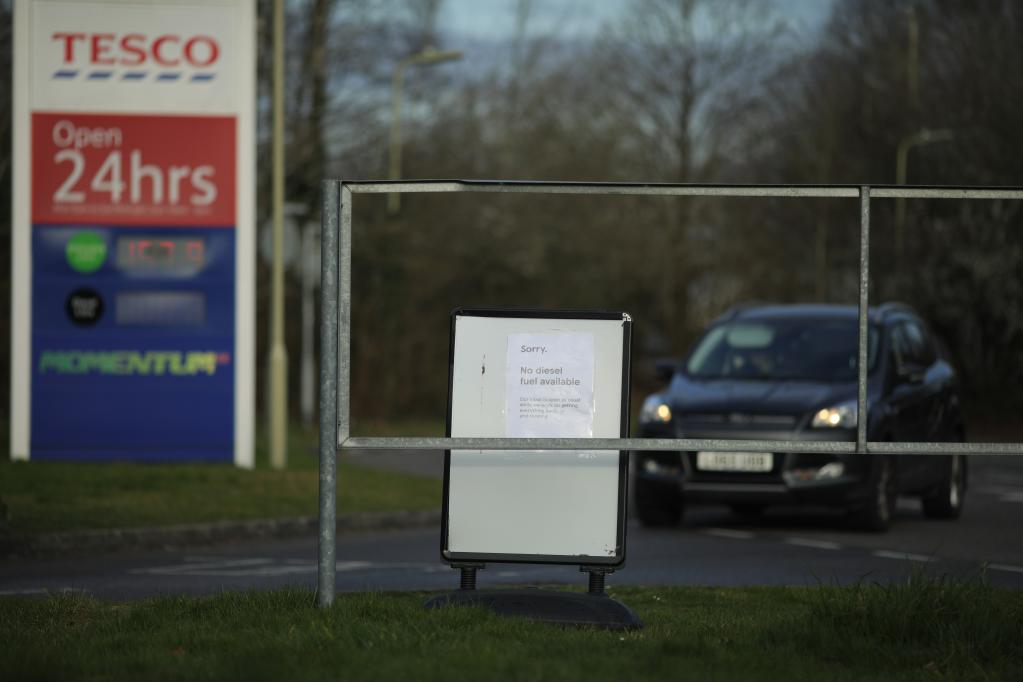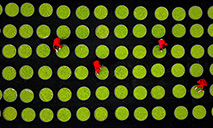Interview: Russia-Ukraine conflict poses new challenge to global food security, says FAO official

People go shopping at a supermarket in Lviv, Ukraine, Feb. 28, 2022. (Xinhua/Ren Ke)
- "Many countries rely on supplies from Ukraine and Russia for their food import needs, including numerous least developed countries and low-income food-deficit countries," said Boubaker Ben-Belhassen, director of FAO's trade and markets division.
- "Disruptions to Ukrainian and Russian grain and oilseed production and exports and restrictions on Russia's exports can have significant impacts on global food security."
ROME, April 1 (Xinhua) -- The ongoing Russia-Ukraine conflict, which came at a time when economies worldwide are still grappling with the negative effects of COVID-19, poses a new challenge to global food security, an official with the United Nations Food and Agriculture Organization (FAO) has said.
"Many countries rely on supplies from Ukraine and Russia for their food import needs, including numerous least developed countries and low-income food-deficit countries," Boubaker Ben-Belhassen, director of FAO's trade and markets division, told Xinhua in a recent written interview.
Russia and Ukraine are major agricultural producers and exporters, he said, adding that Russia stood as the world's top exporter of nitrogen fertilizers, the second leading supplier of potassium fertilizers and the third largest exporter of phosphorous fertilizers in 2021.
"Disruptions to Ukrainian and Russian grain and oilseed production and exports and restrictions on Russia's exports can have significant impacts on global food security," noted Ben-Belhassen.

Photo taken on March 10, 2022 shows a notice saying that no diesel fuel is available at a petrol station in Basingstoke, Britain. (Photo by Tim Ireland/Xinhua)
The conflict is resulting in reduced exportable supplies, as well as higher energy, fertilizer and overall input prices, which in turn translate into higher costs of production and eventually higher food prices, according to the official.
"FAO's simulations suggest that international food and feed prices could rise by 8-22 percent above the baseline levels and the number of undernourished people could increase by 8-13 million people in 2022/23 (season)," he said, adding the actual impact will depend on the duration and magnitude of the conflict.
Meanwhile, the pandemic could have lasting effects on global food security, Ben-Belhassen noted.
Preliminary estimations published in the 2020 edition of the State of Food Security and Nutrition in the World report suggested that the pandemic may add 83-132 million people to the ranks of the undernourished in 2020 alone, he said.
The economic rebound in 2021 was highly uneven among regions, he said, adding that many developing nations, especially in Sub-Sahara Africa and Latin America and the Caribbean, are not foreseen to return to pre-pandemic economic growth levels before 2024.
"This will continue to widen pre-existing inequalities and undermine poverty reduction and sustainable development progress," he said.
Citing an FAO's analysis, Ben-Belhassen noted that about 660 million people may still face hunger in 2030, 30 million more people than in a scenario in which the pandemic had not occurred.
The pandemic has worsened the negative trends that already existed before the crisis, he said.
Factors including protracted conflicts, climate variability, and economic slowdowns and downturns interact to the detriment of food security and nutrition by creating multiple, compounding impacts at many different points within global food systems, and the pandemic has aggravated the situation, he explained.

Charity staff members deliver free food on the plaza of the Lviv railway station in Lviv, Ukraine, March 9, 2022. (Xinhua/Ren Ke)
"High food prices represent another threat to global food security," noted the FAO official. In February, the FAO Food Price Index was up some 21 percent from a year ago and reached an all-time record high, he said, adding those to be most affected are low-income food-deficit countries.
With the current pace, the international community is "not on track" to achieve the target of ending hunger by 2030, he said. "Bold and urgent actions need to be taken and scaled up to accelerate progress, especially actions to address inequality in food availability and access to adequate and nutritious foods."
Noting that China is a key player in world food markets, Ben-Belhassen said there is a lot to learn from the experience of China on fighting hunger.
China's effort towards more sustainable agrifood systems and improving agricultural production and quality "is a step in the right direction and can help substantially in the fight against poverty and hunger and in achieving the SDGs (Sustainable Development Goals)," he said.
The official also highlighted "the role of China as one of the strongest proponents of South-South approach to development cooperation."
"China has been acting as a significant participant and active supporter of the FAO's South-South and Triangular Cooperation initiative," he said.
"FAO greatly values China's contribution to the program, which now operates in 20 countries and has reached more than 100,000 beneficiaries and many more indirect beneficiaries at grassroots level in rural areas," he said.
"China's development experience will be an important resource to support other developing countries in achieving the 2030 Agenda for Sustainable Development and the SDGs," he added.
Photos
Related Stories
- Dialogue the only solution for Ukraine crisis: Chinese FM
- Fire at oil depot in Russia's Belgorod following two Ukrainian helicopters' attack, says regional governor
- Turkey may host Russian, Ukrainian FMs again
- Turkey welcomes guarantor role for Russia-Ukraine peace deal: Turkish president
- Polish president meets with Ukrainian FM
Copyright © 2022 People's Daily Online. All Rights Reserved.










